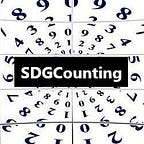Leveraging Data Insights for Health Financing Delivery in Low and Middle Income Countries
SDGCounting UN World Data Forum Session Notes
This post is part of a series highlighting sessions from the 2020 UN Data Forum. Watch every session or read our summary.
Summary: Huge challenges remain in ensuring sustainable financing and capacity to deliver equitable, cost-effective and quality healthcare in Africa and other low and middle income countries. A lack of reliable data is at the root of these challenges. But, with increasing use of digital technology in Africa, an opportunity exists to strengthen data-collection systems. This session showcases innovations and shared lessons about digital-based data collection and analysis for Universal Health Coverage (UHC).
Speakers
- Diane Karenzi Muhongerwa, WHO-AFRO
- Lydia Dsane-Selby, National Health Insurance Authority, Ghana,
- Manjiri Bhawalkar, The Global Fund
- Marion Cros, Global Financing Facility,
- Matthew Owili, Deputy Governor of Kismu County (Kenya)
- Kwasi Boahene, The PharmAccess Group
Key Takeaways
Lydia Dsane-Selby, National Health Insurance Authority, Ghana
- During COVID, in Ghana, 80% of people who needed insurance renewal did self renewal on their phone (a feature that was implemented last year); it’s important to utilize the prevalence of mobile phones.
- But, people are still avoiding going to the hospital. The government of Ghana needs to analyze who is not going to the hospital, why and what needs to be done.
- We have an idea of who is using services at what time through digitization (major hospitals all submit their claims digitally, which allows us to do analysis and have a better idea of what the cost drivers are).
- Once you share your analytics with stakeholders, there’s an interest to provide better data.
- Privacy is a big issue; Ghana has a data protection commission and companies have to adhere to these policies — it’s not perfect but there are ways to try to protect data.
Kwasi Boahene, The PharmAccess Group
- People (mostly mothers and their children) have been afraid to go to the hospital because of risk of infection.
- There has been a shift in resources during COVID-19 and the fear is that we might lose progress that was made on HIV and other diseases.
Manjiri Bhawalkar, The Global Fund
- The Global Fund is used to fighting infectious diseases, so it has processes in place; it immediately instituted 3 facilities and has launched a 4-pronged response to protect the HIV, TB and Malaria advancements, to protect health workers, and to focus on COVID-19 testing/tracing/isolation.
- In some countries, we’ve relied on door to door delivery for tests and medicines, expanding home-based care,
- It is increasingly on the Global Fund’s agenda to engage with insurance in different countries for Malaria, TB, etc. Insuring the treatments of these three diseases has been positive and we continue to have these conversations in as many countries as possible.
- The private sector has a lot of knowledge of digitization, so we try to partner with them as much as possible. Currently, the Global Fund is partnering with Mastercard to improve the delivery of health programs in many African countries.
Diane Karenzi Muhongerwa, WHO-AFRO
- Limited fiscal space causes an inability to raise adequate funds for health in many African countries.
- The WHO Africa region is developing tools for health financing.
bp
